Of Greek Gods and Indian Devas
Originally posted on Feb 23, 2011:
I was having a chat with my 9-year-old son, Ishaan over breakfast. He happened to tell me about something which was discussed in his class. The topic was something new to me and also very exciting for him, as he got the opportunity to teach me something.
Of course it’s another matter that, unknown to him, I consider him as my biggest teacher, as I believe babies, being closes to The Source are as Divine as our pure souls. And seeing him growing up has taught me much about life as we perceive it.
Coming back to the topic, what totally intrigues both of us was the similarities between the Greek mythology and Indian mythology.
That prompted my online research to dig a bit more further. This note is a small briefing of those findings.
Now mythology is the oral transfer of stories or myths of a particular group of people or culture passed on through generations inculcating an idea about the values, culture and intellectual development of those cultures and civilizations. Ancient Greek and Indian civilizations are considered two of the most oldest, advanced and colorful mythologies. Their religions were correspondingly called Hellenism and Hinduism. These two religions and cultures existed in different parts of the world and were separated by great distances. But there are some amazing similarities between their fables and myths.
Good and Evil
The Gods of Mount Olympus represents good while their antitheses are the Titans represent evil. In the same way we have the Asuras as the chief tomentors of the Devas. The interesting fact in both these mythologies is that both good and evil are fathered by one and the same being. While the Gods and the Titans were fathered by Cronus, the Devas and the Asuras were fathered by Kashyap. There is a constant struggle between the forces of Good and Evil in both mythologies. Throughout the mythologies we can see the Gods tricking their antithesis during instances when they require the Titan’s or the Asura’s help.
Gods, Men and Evil
While men have always worshipped and showed unfaltering devotion towards the Gods, the Gods on their part have not been as benevolent as they might lead us to believe. In fact the Gods’ attitude towards men has been quite curious to say the least, almost bordering on tyrannical. They punish them for the slightest of disrespect, putting inexplicable curses on them and even raping or seducing their women. It is ironic that the Titans and the Asuras are considered to be evil when they have done more good to men than the Gods and Devas in certain instances. Their behavior and attitude towards men is exemplified by two incidents in the mythology.
In Greek mythology there is the story of Prometheus who stole fire from the Gods and gave it to men. Men after receiving fire began to be developed and more enlightened. Zeus was so enraged by this that he punished Prometheus to be chained to a Mount Caucasus. Each day an Eagle would come and peck out his liver, which would be regenerated in the night. This cycle continued until Hercules (son of Zeus. Also known as Herakles) killed the eagle and freed Prometheus.
Similarly in Hindu Mythology there is the story of the benevolent Asura king of Kerala called Mahabali. During his reign the kingdom prospered unlike in any other. There was equality and happiness among all. There was neither deceit nor corruption. Indra and the other Devas were jealous and afraid of Mahabali’s popularity and conspired with Lord Vishnu to end his reign. Vishnu came to earth as Vamana (one of his 10 incarnations) and tricked Mahabali into the depths of the underworld, but not before granting the asura king one last wish; that to visit his subjects once a year. Even today people of Kerala celebrate his day of return as the famous Onam festival.
Prophesies and their impact
Prophesies have a major role to play in these mythologies. One of the most recurring themes in these myths is that of a main character trying to avert a particular prophecy but in turn succumbing to his destiny. In both mythologies we can see this theme recurring again and again.
One such instance in the Greek mythology is that of Cronus who becomes aware of a prophecy that he will be overthrown by one of his children. In order to avert this fate Cronus begins to swallow each one of his children as soon as they are born. When the sixth child Zeus is born, Rhea (Cronus’ wife) devises a plan to save him with the help of Cronus’ mother Gaia. Rhea secretly gives birth to Zeus and arranges for him to be brought up in exile. Later a grown up Zeus comes back to free his siblings and forces Cronus to flee.
Similarly in Hindu mythology King Kansa is foretold that the eight son of his sister Devaki would kill him. To avert this, Kansa imprisons both Devaki and her husband Vasudeva and allows them to live on the condition that they hand over all their newborns to him. Devaki’s eighth son was Krishna (a reincarnation of Lord Vishnu) and as Kansa had killed all their previous children, they arranged for the child to be brought up in exile and presented another newborn to Kansa in his place. A grown up Krishna later returned to avenge the death of his brothers and killed Kansa.
There are many other similarities between the various mythologies in the world. It is not possible to cover all of them under the realms of a single post. But it is infinitely fascinating to learn more and more about them as they shows us how similar we all are, even though we have different cultures and are from different civilizations. Maybe we are the same no matter which part of the world we really are from.
Thanks to "http://keralaarticles.blogspot.com/2007/05/comparison-of-hindu-and-greek-mythology.html"
Wikipedia.
If you liked this post do follow us, and do share this on Facebook and twitter. Spread the cheer!
♥ Love and Light ♥
I was having a chat with my 9-year-old son, Ishaan over breakfast. He happened to tell me about something which was discussed in his class. The topic was something new to me and also very exciting for him, as he got the opportunity to teach me something.
Of course it’s another matter that, unknown to him, I consider him as my biggest teacher, as I believe babies, being closes to The Source are as Divine as our pure souls. And seeing him growing up has taught me much about life as we perceive it.

Coming back to the topic, what totally intrigues both of us was the similarities between the Greek mythology and Indian mythology.
That prompted my online research to dig a bit more further. This note is a small briefing of those findings.
Now mythology is the oral transfer of stories or myths of a particular group of people or culture passed on through generations inculcating an idea about the values, culture and intellectual development of those cultures and civilizations. Ancient Greek and Indian civilizations are considered two of the most oldest, advanced and colorful mythologies. Their religions were correspondingly called Hellenism and Hinduism. These two religions and cultures existed in different parts of the world and were separated by great distances. But there are some amazing similarities between their fables and myths.
Supreme Gods
The three elder or "Supreme" gods of Hinduism are Brahma(The Creator), "Vishnu" ( The Protector and Preserver) and Mahesh also known as Shiva (The Destroyer of evil forces and the Transformer). Shiva is also the most powerful god. The Supreme gods of Greek mythology are Zeus ( The Lord of the skies) , Poseidon ( The Lord of the Seas) and Hades (The Lord of the Underworld). The youngest of the Greek brothers is ZeusZeus and Indra
Similarities
Zeus, the King of the Greek Gods can fairly be compared to Indra, the Rig-Vedic King of Hindu Gods. Both these deities had control over weather and had thunderbolts as their weapons. They both had kingly chariots. Like the dwelling place of Zeus and other Olympian Gods Mount Olympus, the dwelling place of the Hindu Gods was in Svarga located high above in the sky on Mount Meru. Indra represents Thursday in the days of the week. So does Zeus.Dissimilarities
Indra's reputation and role diminished in later Hinduism with the rise of the Trimurti.Unlike Zeus, the final and Supreme God of the Greek mythology, Indra is not the supreme God anymore. He is only the king of the Devas. Above Indra, are the three most powerful and Supreme deities, Brahma (The creator), Vishnu (The protector and preserver) and Shiva (The Destroyer of evil forces and the transformer).Hera and Laxmi
Similarities
Hera and Laxmi are also similar to an extent, since both of them are the Goddesses of Home and Wealth and Prosperity.Dissimilarities
Laxmi is not only the Goddess of Wealth, but she is the Goddess of preservation too. Taking a deep look into the Vedas, we visualize that Laxmi is referred to as Narayani. the protecting power of Lord Narayana and Vishnu).Athena and Saraswati
Similarities
Both Athena and Saraswati are the Goddesses of Wisdom and Learning. They are also the Goddesses of Culture and knowledge, which a man may acquire throughout during his life.Dissimilarities
In addition to being the Goddess of learning, Athena is also the Goddess of war. But instead, Saraswati is the Goddess of creation since she is the creative energy of Lord Brahma (the Creator). Athena is often seen to carry shield and other weapons, whereas Goddess Saraswati carries a Lotus flower (as a symbol of enrichment), the musical instrument Veena (as a symbol of culture), Rudraksha (as a symbol of homage to the Supreme Lord Shiva) and she also blesses devotees with another hand.Hades and Yama
Similarities
Hades is the Lord of the underworld, and Yama is also the same in Hindu Mythology. Both these Gods are associated with Death and afterlife.Dissimilarities
Yama's realm is the Naraka, which is said to be in another dimension. But the realm of Hades is said to be below the earth, that is in underworld. In addition to being the Lord of the Souls, Yama is also the final judge of the human souls. His role as a judge can be equated to that of Osiris. Yama is only the ruler of death and afterlife to ordinary people, to those who are devoted to Shiva or Krishna, Yama cannot touch them. Envoys of Shiva and Krishna come to their devotees at the time of death and take them to their abode. All others will continuously remain in Samsara. They will be reborn. Hades takes the souls of all to the underworld. Yama takes the souls of ordinary people to their next body/life.Poseidon and Varuna
Similarities
Both Poseidon and Varuna are the Gods of ocean. They are the protectors of aquatic creatures.Dissimilarities
Poseidon carries the Golden Trident as his weapon, whereas Varuna carries the Pash (the weapon which is the combination of an arrow and a trident). Further, Varuna is also the God of water, but the Greek God of water is the Titan Oceaneus.Haphaestus and Vishwakarma
Similarities
Both Haphaestus and Vishwakarma are the worker Gods, who design and make weapons for the Gods and manufacture tools.Dissimilarities
Haphaestus is said to have a central workshop or factory, whereas there is no such concept for Vishwakarma (It will be hard to agree that Vishwakarma does not have factory or central workshop). Further, the mascot of Vishwakarma is elephant, but Haphaestus has no such mascot to carry him. Vishwakarma is God of tools and factories. Even to this day, During Vishwakarma Puja people pray at factories and in their workshop. So, this would rather be counted as similarity than a difference.Similarities
Ares and Kartik are both the Gods of war and fighting. They both are depicted as warriors, carrying weapons as a sign of inspiration.Dissimilarities
Kartik is said to have peacock as his mascot and he also has six heads, unlike Ares, who has no mascot and single head (or face).Also Kartik personality is closer with Athena where they both represent tactical and strategical part of warfare while Ares represents blood lust.Kronos and Mahakala
Similarities
Both these Gods are the Gods of time and space.Dissimilarities
Kronos has a definite figure, whereas Mahakala is not said to have one, since he is the one, who is invisible to all and controls everything.Concept of mascots and multiple pairs of hands and heads
The Greek Gods do not have mascots or Multiple pairs of Hands, unlike the Hindu Gods. To exemplify, Lord Visnu has 4 hands, Lord Brahma has 4 faces.Concept of afterlife
According to Greek texts, after death the spirit leaves the body and moves to the underworld and travels to Hades's shadowy realm after crossing the Lethe river on by the Charon ferry. But the Hindu idea is far more developed. In Hindu Texts, it is said that the souls will reincarnate again and again till they get elevated to such a religious stage to break out of the Samsara wheel. Ultimately, the great assurances given in the scriptures tell us that all souls will get dissolved into the supreme God, the formless god called Brahman or Ishwar.Good and Evil
The Gods of Mount Olympus represents good while their antitheses are the Titans represent evil. In the same way we have the Asuras as the chief tomentors of the Devas. The interesting fact in both these mythologies is that both good and evil are fathered by one and the same being. While the Gods and the Titans were fathered by Cronus, the Devas and the Asuras were fathered by Kashyap. There is a constant struggle between the forces of Good and Evil in both mythologies. Throughout the mythologies we can see the Gods tricking their antithesis during instances when they require the Titan’s or the Asura’s help.
Gods, Men and Evil
While men have always worshipped and showed unfaltering devotion towards the Gods, the Gods on their part have not been as benevolent as they might lead us to believe. In fact the Gods’ attitude towards men has been quite curious to say the least, almost bordering on tyrannical. They punish them for the slightest of disrespect, putting inexplicable curses on them and even raping or seducing their women. It is ironic that the Titans and the Asuras are considered to be evil when they have done more good to men than the Gods and Devas in certain instances. Their behavior and attitude towards men is exemplified by two incidents in the mythology.
In Greek mythology there is the story of Prometheus who stole fire from the Gods and gave it to men. Men after receiving fire began to be developed and more enlightened. Zeus was so enraged by this that he punished Prometheus to be chained to a Mount Caucasus. Each day an Eagle would come and peck out his liver, which would be regenerated in the night. This cycle continued until Hercules (son of Zeus. Also known as Herakles) killed the eagle and freed Prometheus.
Similarly in Hindu Mythology there is the story of the benevolent Asura king of Kerala called Mahabali. During his reign the kingdom prospered unlike in any other. There was equality and happiness among all. There was neither deceit nor corruption. Indra and the other Devas were jealous and afraid of Mahabali’s popularity and conspired with Lord Vishnu to end his reign. Vishnu came to earth as Vamana (one of his 10 incarnations) and tricked Mahabali into the depths of the underworld, but not before granting the asura king one last wish; that to visit his subjects once a year. Even today people of Kerala celebrate his day of return as the famous Onam festival.
Prophesies and their impact
Prophesies have a major role to play in these mythologies. One of the most recurring themes in these myths is that of a main character trying to avert a particular prophecy but in turn succumbing to his destiny. In both mythologies we can see this theme recurring again and again.
One such instance in the Greek mythology is that of Cronus who becomes aware of a prophecy that he will be overthrown by one of his children. In order to avert this fate Cronus begins to swallow each one of his children as soon as they are born. When the sixth child Zeus is born, Rhea (Cronus’ wife) devises a plan to save him with the help of Cronus’ mother Gaia. Rhea secretly gives birth to Zeus and arranges for him to be brought up in exile. Later a grown up Zeus comes back to free his siblings and forces Cronus to flee.
Similarly in Hindu mythology King Kansa is foretold that the eight son of his sister Devaki would kill him. To avert this, Kansa imprisons both Devaki and her husband Vasudeva and allows them to live on the condition that they hand over all their newborns to him. Devaki’s eighth son was Krishna (a reincarnation of Lord Vishnu) and as Kansa had killed all their previous children, they arranged for the child to be brought up in exile and presented another newborn to Kansa in his place. A grown up Krishna later returned to avenge the death of his brothers and killed Kansa.
There are many other similarities between the various mythologies in the world. It is not possible to cover all of them under the realms of a single post. But it is infinitely fascinating to learn more and more about them as they shows us how similar we all are, even though we have different cultures and are from different civilizations. Maybe we are the same no matter which part of the world we really are from.
Thanks to "http://keralaarticles.blogspot.com/2007/05/comparison-of-hindu-and-greek-mythology.html"
Wikipedia.
If you liked this post do follow us, and do share this on Facebook and twitter. Spread the cheer!
♥ Love and Light ♥
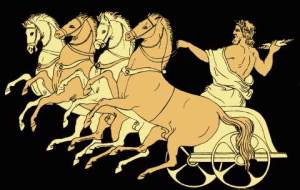
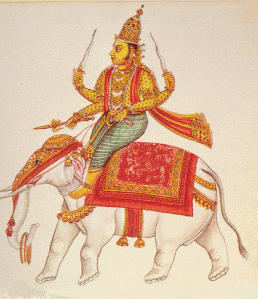
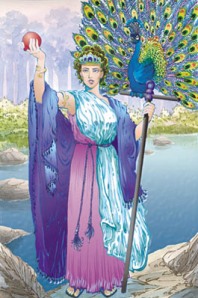

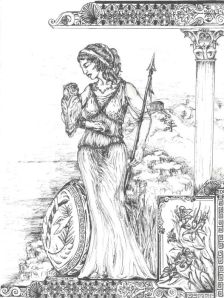
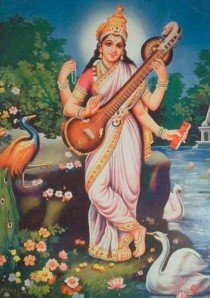
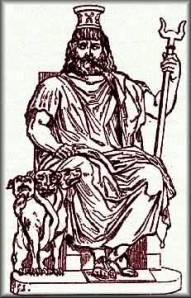

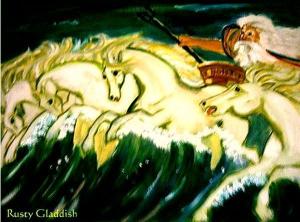

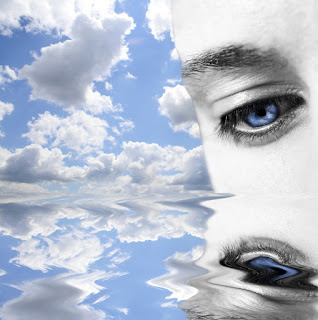
great stuff by admin.. provide hanuman chalisa if possible
ReplyDeleteawesome article..... hanuman chalisa
ReplyDelete